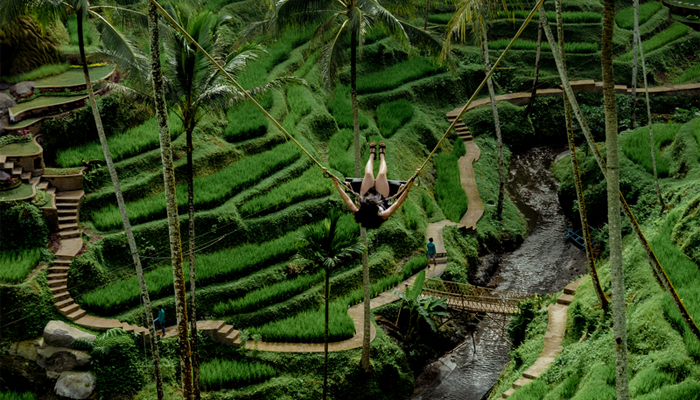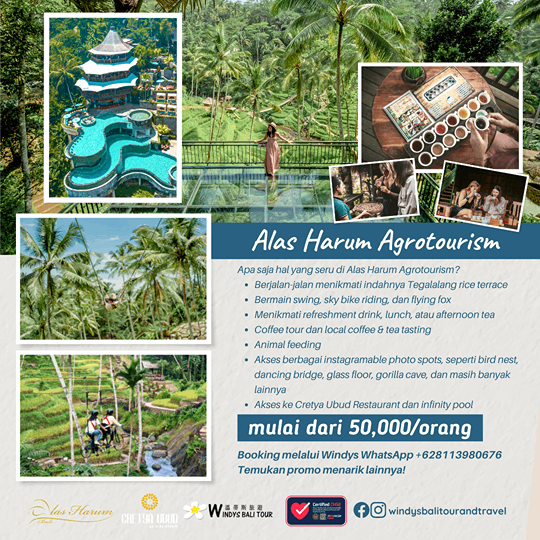A Food lover's Paradise: Culinary Delights of Agrotourism in Ubud
A Food lover's Paradise: Culinary Delights of Agrotourism in Ubud
Blog Article
Discovering the Abundant Culture and Impressive Landscapes of Agrotourism in Ubud
Ubud, usually commemorated as the heart of Bali, offers an unique chance for those looking for to experience agrotourism that seamlessly mixes social splendor with breathtaking landscapes. As vacationers browse with Ubud's lively tapestry of customs, they are invited to discover the stories behind each cultural practice and landscape attribute.
Uncovering Ubud's Cultural Heritage
Nestled in the heart of Bali, Ubud acts as a lively epicenter for those eager to explore the island's abundant cultural heritage. Known for its imaginative practices, Ubud is a hub where ancient techniques satisfy modern expressions, creating a special tapestry of cultural experiences. Site visitors are drawn to its myriad of holy places, workshops, and galleries, each offering a glimpse right into Bali's creative and historical heritage.
Central to Ubud's cultural attraction is the Ubud Royal residence, a considerable landmark that stands as a testimony to the area's royal heritage. The palace regularly organizes standard dance efficiencies, offering an authentic understanding into Balinese narration through dancing and music. The roads of Ubud are lined with galleries showcasing works of both distinguished Balinese artists and arising talents, showing the island's dynamic art scene.

Immersive Agricultural Knowledge

In addition, Ubud's agrotourism campaigns typically include workshops on lasting farming practices. These workshops stress the importance of organic farming, permaculture, and biodiversity conservation, commonly under the guidance of well-informed experts. They work as an instructional system for travelers, fostering a much deeper recognition for the complexities of sustainable farming.
Furthermore, site visitors can check out coffee and cacao haciendas, where they find out regarding the procedures of growing and production. Assisted trips supply in-depth explanations of each action, from bean to cup or cacao capsule to delicious chocolate bar, improving the total understanding of these considerable farming products.
These immersive experiences not just enrich site visitors' understanding of Ubud's agricultural heritage however also advertise sustainable tourism techniques, making certain the preservation of these social landscapes for future generations.
Breathtaking Rice Terraces and Landscapes
Building on the immersive farming experiences, site visitors are drawn to the fascinating breathtaking rice terraces and landscapes that specify Ubud's countryside. The renowned Tegalalang Rice Terraces are specifically popular, supplying a charming display of Balinese resourcefulness in farming. These balconies are not just useful yet likewise offer as a testimony to the unified relationship between the Balinese people and their environment. The subak watering system, a UNESCO-recognized social heritage, showcases a ancient and sustainable method of water management that continues to support regional agriculture.
As site visitors traverse the winding paths through the terraces, they are consulted with scenic views that stretch throughout green fields, stressed by persuading coconut palms and the distant silhouette of Mount Agung. The landscape provides a serene background that welcomes reflection and admiration of nature's elegance (Agrotourism in Ubud). For those interested in digital photography, the ever-changing light and darkness cast by the sunup or sundown supply many chances for catching spectacular photos
Beyond the terraces, Ubud's moving hills and lush greenery develop a varied tapestry that beckons expedition. Hiking trails meander with these landscapes, enabling site visitors to get in touch with the land and experience the serene rhythm of country life.
Farm-to-Table Culinary Delights
Amidst the all-natural appeal of Ubud's landscapes, the farm-to-table activity uses an authentic cooking experience that links site visitors with the region's agricultural heritage. This strategy celebrates the symbiotic partnership between the land and its produce, with neighborhood farms giving fresh, organic ingredients to Ubud's innovative cooks. Visitors are welcomed to take part in a gastronomic journey where the origins of each component are transparently showcased.
In Ubud, farm-to-table eating transcends plain consumption; it comes to be an academic experience. Restaurants typically provide assisted excursions of the ranches supplying their cooking areas, allowing diners to witness lasting farming practices firsthand. This connection cultivates a much deeper admiration for the meticulous treatment that enters into cultivating the plants and raising animals.
The cooking offerings reflect the abundant variety of Ubud's agricultural landscape, including recipes that highlight seasonal fruit and vegetables and standard Balinese flavors. From vibrant salads teeming with exotic eco-friendlies to fragrant curries infused with fresh herbs, each plate is a testimony to the area's bountiful harvests.
Furthermore, the websites farm-to-table principles sustains local farmers and neighborhoods, ensuring that agricultural customs are maintained while advertising financial sustainability. This movement highlights a dedication to top quality, sustainability, and the celebration of Ubud's special terroir.
Involving With Regional Craftsmens
Several visitors discover themselves captivated by the intricate workmanship of Ubud's neighborhood craftsmens, whose job mirrors the area's abundant social heritage. These craftsmens, commonly masters of anonymous their craft, add significantly to Ubud's vibrant cultural landscape. From standard batik fabrics to meticulously carved wooden artifacts, each item narrates linked with generations of know-how and practice.
Involving with these craftsmens gives an unique opportunity to dive deeper into Balinese culture. Many workshops offer hands-on experiences, where tourists can find out methods passed down through centuries. These interactive sessions not just foster appreciation for the artisans' abilities but additionally offer a meaningful connection to the region's history and customs.
Site visitors can discover craftsmen villages such as Mas, renowned for its fine wood makings, or Celuk, popular for exquisite silver precious jewelry. Right here, one can witness the dedication and accuracy called for to produce each work of art. Purchasing straight from these artisans ensures that the earnings sustain local communities and maintain conventional practices.
In Ubud, involving with neighborhood craftsmens is not simply a vacationer activity; it is an enriching cultural exchange that boosts the agrotourism experience, leaving site visitors with a deeper understanding and admiration of Bali's imaginative heritage. - Agrotourism in Ubud
Final Thought
The exploration of Ubud's read this article agrotourism offers a profound recognition for Balinese social heritage and natural elegance. Jointly, these elements promote a deeper understanding and gratitude of Ubud's sustaining social and all-natural allure.
Central to Ubud's social allure is the Ubud Royal residence, a substantial landmark that stands as a testament to the region's royal heritage.Ubud supplies a myriad of immersive agricultural experiences that allow visitors to engage deeply with the island's agrarian lifestyle.Building on the immersive agricultural experiences, visitors are drawn to the exciting breathtaking rice balconies and landscapes that specify Ubud's countryside.Among the all-natural beauty of Ubud's landscapes, the farm-to-table movement offers an authentic culinary experience that connects visitors with the region's agricultural heritage.Numerous visitors discover themselves mesmerized by the complex workmanship of Ubud's neighborhood craftsmens, whose work reflects the region's rich cultural heritage.
Report this page